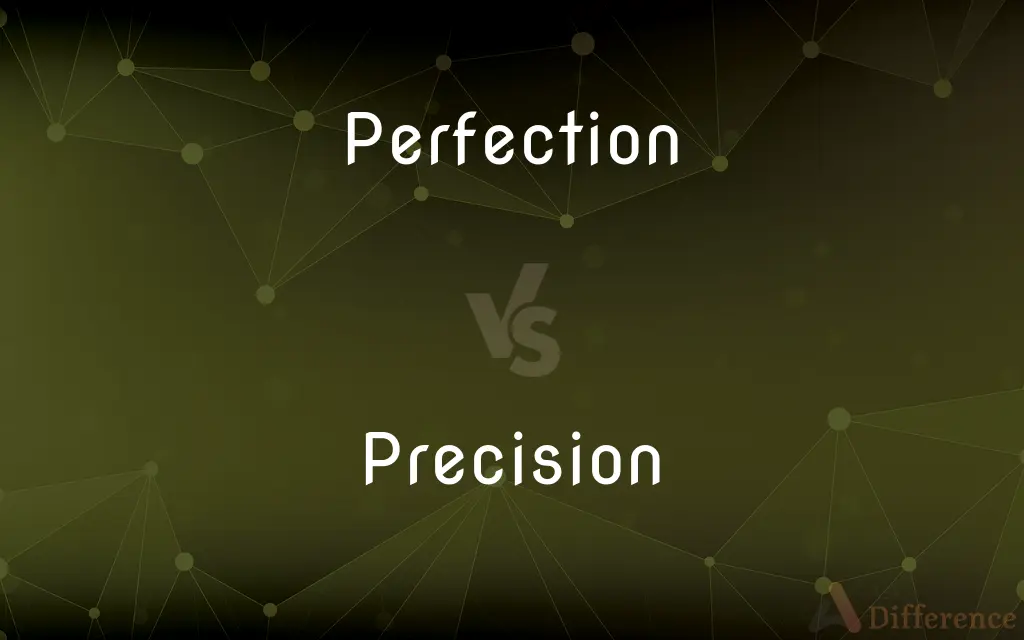Perfection vs. Precision — What's the Difference?
By Tayyaba Rehman & Urooj Arif — Updated on April 20, 2024
"Perfection" refers to the state of being flawless or without defect, often an idealized concept, while "precision" pertains to the accuracy and exactness in performance or measurement.

Difference Between Perfection and Precision
Table of Contents
ADVERTISEMENT
Key Differences
Perfection is a broad, often subjective term that implies a state of completeness and flawlessness that is typically idealized or theoretical in nature. On the other hand, precision involves the detailed accuracy of an action or measurement, focusing on the reproducibility and exactness of results.
Perfection is sought in various fields, from art to technology, implying a condition where nothing could be improved. Precision, however, deals with the specificity and exactness of operations, essential in contexts like scientific measurements or engineering where small deviations can have significant impacts.
While perfection is an ultimate, often unattainable goal that can vary by individual perspective, precision is quantifiable and measurable, relying on consistent standards and methods to ensure accuracy and repeatability in processes.
In artistic endeavors, perfection might relate to the ideal completion of a piece, according to the artist’s vision or cultural standards. Conversely, in technical tasks, precision is critical to ensure that components fit together correctly and function as intended without error.
Perfection can often lead to a pursuit that may never fully satisfy, as it can be infinitely refined or subject to different interpretations. Precision, in contrast, can be objectively achieved and verified through tools and measurements that confirm the exactness of the outcome.
ADVERTISEMENT
Comparison Chart
Definition
State of being completely free from faults
Exactness and accuracy in action or measure
Focus
Idealized flawlessness
Measurable accuracy and consistency
Context
Broadly applicable across various fields
Often associated with scientific measurements
Objective
Subjective and varies by perspective
Objective and quantifiable
Outcome
Often unattainable and theoretical
Achievable and demonstrable
Compare with Definitions
Perfection
The condition of being free from all flaws or defects.
The sculpture's smooth finish was a testament to the artist’s pursuit of perfection.
Precision
The quality, condition, or fact of being exact and accurate.
The device was manufactured with high precision.
Perfection
An ideal instance or condition regarded as the ultimate standard.
For many, her performance in the play was perfection.
Precision
The ability to reproduce a measurement consistently.
The experiment’s success depended on the precision of the instruments.
Perfection
A perfect embodiment or example of something.
The meal was perfection, each flavor balanced with the others.
Precision
Marked by or adapted for accuracy and exactness.
Precision tools are essential for microengineering.
Perfection
The highest degree of proficiency, skill, or excellence, as in some art.
He practiced the violin daily, striving for perfection.
Precision
Exact in measuring, recording, or execution.
The chemist's precision in titration ensured accurate results.
Perfection
A state beyond improvement.
In her eyes, the wedding day was sheer perfection.
Precision
Operating with exactness and without allowing for errors.
The surgical robot performed with incredible precision.
Perfection
Perfection is a state, variously, of completeness, flawlessness, or supreme excellence. The term is used to designate a range of diverse, if often kindred, concepts.
Precision
The quality, condition, or fact of being exact and accurate
The deal was planned and executed with military precision
Perfection
The quality or condition of being perfect.
Precision
The state or quality of being precise; exactness.
Perfection
The act or process of perfecting
Perfection of the invention took years.
Precision
The ability of a measurement to be consistently reproduced.
Perfection
A person or thing considered to be perfect.
Precision
The number of significant digits to which a value has been reliably measured.
Perfection
An instance of excellence.
Precision
Used or intended for accurate or exact measurement
A precision tool.
Perfection
The quality or state of being perfect or complete, so that nothing substandard remains; the highest attainable state or degree of excellence
We seek complete perfection.
The system runs to perfection.
To imitate a model to perfection
Precision
Made so as to vary minimally from a set standard
Precision components.
Perfection
A quality, endowment, or acquirement completely excellent; an ideal; faultlessness; especially, the divine attribute of complete excellence.
Precision
Of or characterized by accurate action
Precision bombing.
Perfection
To perfect.
Precision
The state of being precise or exact; exactness.
Perfection
The quality or state of being perfect or complete, so that nothing requisite is wanting; entire development; consummate culture, skill, or moral excellence; the highest attainable state or degree of excellence; maturity; as, perfection in an art, in a science, or in a system; perfection in form or degree; fruits in perfection.
Precision
The ability of a measurement to be reproduced consistently.
Perfection
A quality, endowment, or acquirement completely excellent; an ideal faultlessness; especially, the divine attribute of complete excellence.
What tongue can her perfections tell?
Precision
(mathematics) The number of significant digits to which a value may be measured reliably.
Perfection
To perfect.
Precision
(bridge) A bidding system that makes use of many artificial bids to describe a hand quite precisely.
Perfection
The state of being without a flaw or defect
Precision
Used for exact or precise measurement.
Perfection
An ideal instance; a perfect embodiment of a concept
Precision
Made, or characterized by accuracy.
Perfection
The act of making something perfect
Precision
The quality or state of being precise; exact limitation; exactness; accuracy; strict conformity to a rule or a standard; definiteness.
I have left out the utmost precisions of fractions.
Precision
The quality of being reproducible in amount or performance;
He handled it with the preciseness of an automaton
Note the meticulous precision of his measurements
Common Curiosities
What is the main difference between perfection and precision?
Perfection is the ideal state of flawlessness, often subjective and theoretical, while precision focuses on the accuracy and exactness of a process or measurement, which is objective and quantifiable.
Can an artist achieve perfection?
Artists may strive for perfection based on personal or cultural standards, but achieving it may depend on subjective interpretations.
Why is precision important in scientific measurements?
Precision ensures that scientific measurements are accurate and reproducible, which is crucial for verifying results and maintaining the integrity of scientific research.
What roles do perfection and precision play in technology development?
In technology development, perfection is often the driving force behind innovation, while precision is critical in the actual execution and functionality of technological solutions.
What are the drawbacks of pursuing perfection?
Pursuing perfection can lead to inefficiencies, frustration, and wasted resources, especially if the standards set are unattainable or not aligned with practical needs.
Can there be perfection in precision?
While perfection in precision might imply a state where measurements cannot be made more accurately, it is more about achieving the highest standard of exactness possible within current technological limits.
What tools are used to measure precision?
Tools like calipers, micrometers, and precision scales, as well as software and analytical instruments, are used to measure and ensure precision in various fields.
Is perfection attainable in practical terms?
In many cases, perfection is a theoretical goal rather than a practical reality, as it can always be subjectively improved upon.
How does precision impact everyday life?
Precision impacts everyday life in various ways, from the accuracy of timekeeping devices to the reliability of cars and electronic appliances, ensuring functionality and safety.
Can a process be precise but not perfect?
Yes, processes can achieve precision in terms of accuracy and consistency, even if they do not reach a state of perfection, which might be seen as faultless or ideal.
Can perfection and precision coexist in art and science?
In art and science, perfection and precision can coexist as guiding principles, where precision ensures technical accuracy and perfection drives the pursuit of an ideal form or presentation.
Is striving for perfection a positive trait?
While striving for perfection can motivate excellence and improvement, it can also be counterproductive if it leads to unrealistic expectations or dissatisfaction with reasonable results.
What philosophical questions does the concept of perfection raise?
Philosophically, the concept of perfection can raise questions about the nature of ideal forms, the pursuit of excellence, and the ethical implications of striving for an ultimate state.
How does precision enhance productivity?
Precision enhances productivity by reducing errors, improving efficiency, and ensuring that processes meet specified standards without deviation, leading to better outcomes and lower costs.
How do industries benefit from precision?
Industries benefit from precision through improved product quality, customer satisfaction, and compliance with regulatory standards, all of which contribute to competitiveness and profitability.
Share Your Discovery

Previous Comparison
Mad vs. Insane
Next Comparison
Starring vs. CastAuthor Spotlight
Written by
Tayyaba RehmanTayyaba Rehman is a distinguished writer, currently serving as a primary contributor to askdifference.com. As a researcher in semantics and etymology, Tayyaba's passion for the complexity of languages and their distinctions has found a perfect home on the platform. Tayyaba delves into the intricacies of language, distinguishing between commonly confused words and phrases, thereby providing clarity for readers worldwide.
Co-written by
Urooj ArifUrooj is a skilled content writer at Ask Difference, known for her exceptional ability to simplify complex topics into engaging and informative content. With a passion for research and a flair for clear, concise writing, she consistently delivers articles that resonate with our diverse audience.















































